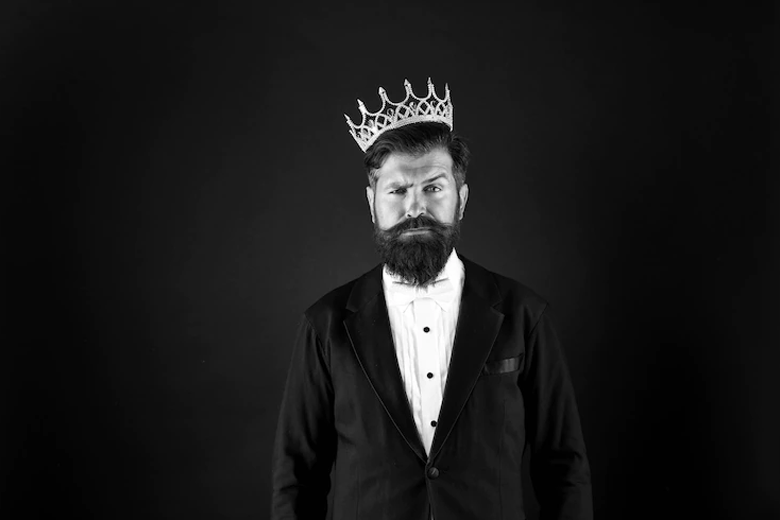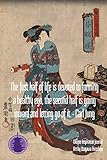
In today’s competitive society, men must cultivate healthy egos to survive and succeed. A gentleman who is confident in his abilities and is capable of presenting himself well to others can use these assets to go far and live a happy life. Men who cultivate inner strength can negotiate confidently with others, take charge when needed, and feel calm and in control in stressful situations.
The ‘ego’ can be defined as ‘the conscious thinking of self,’ so the question of ‘what is the ego?’ is really the question of ‘what is the conscious thinking self?’ Too much positive self-regard or conscious preoccupation with oneself has a dark side. However, an unchecked ego can lead to an egocentric man who feels on top of his game but who is, in reality, spinning out of control. Confidence can turn to megalomania if a man becomes so conscious and focused on his own greatness that he becomes unable to focus on anything else.
Egocentricity, Good or Bad?
Some people are so convinced of their superiority that they feel justified in taking advantage of others—and then blaming the victims when things don’t work out.
They’re often very charming, charismatic, and confident while they’re in control. But, unfortunately, they tend to be quite persuasive too, which makes them dangerous people to cross because they’ll charm you into doing what they want (and then blame you if everything goes wrong).

Egocentrism is not always bad: Some egocentric people have a strong sense of justice or fairness, which can be useful for society as a whole. However, when it comes down to an individual’s self-interests versus those of another person or group who might need help from time to time.
Examples of Egocentric Behavior
Egocentrism, or egocentricity, is the tendency to view ourselves as central or at least more important than anyone else. It’s also commonly known as “egoism” and is related to narcissism—but it’s not narcissistic. As psychologist Ramachandran explains in his book The Emerging Mind: The Highly Evolved Brain of Children and Other Animals, the term “Egocentricity” actually comes from Greek mythology: “In Greek religion, Ego stands for ‘I’ (me) or ‘me first’.” So if you’re becoming more egotistical—taking advantage of others, blaming others when things go wrong—consider this a daring sign that something might be wrong with your psyche.
For example, being confident that you’re the right man for the job is great, but only if you really are the best man for the job. Narcissistic people often over-value their own abilities and talents. They also tend to react badly if anyone suggests they’re not the best man for the job. Their huge ego is a thin skin over a very fragile frame. Confidence helps a man get the job done. On the other hand, overconfidence and an inability to accept criticism are insufferable and damage a man’s ability to grow and mature.
Showcasing one’s abilities is also a valuable talent. That can be a problem if you’re so focused on yourself that you can’t share the spotlight or pay attention to other people’s accomplishments. The narcissist feels incredibly jealous not only of other people’s time and attention but also can’t admit that others might have accomplishments and value of their own.
This can get so out of control that the egocentric man can feel hurt and rejected simply because someone else is getting a little praise and attention. It makes it very hard to maintain good relationships with other people when you’re hogging all the attention and feeling jealous.
Signs Your Healthy Ego is Turning Egocentricity

If you’re constantly telling yourself that you’re better than others, or if your ego is so big that it makes it difficult for you to see reality clearly, then this could be a sign of egocentricity.
Egocentric people are often self-centered and selfish. They have no idea how to give or receive love, and they ignore those who need help from them. A healthy ego is about being aware of your needs and acknowledging them in others—not just taking but also giving back when needed.
Egocentricity is more common in men than it is in women — but it’s not just a “male thing.” However, there can be a different dynamic when both men and women suffer from egocentricity because many women feel responsible for making everything right.
This can lead to some pretty messy dynamics between couples who are trying to overcome their own egos together. If you are one of these people trying to work through your ego issues and make your partner feel secure (or even better yet: someone who loves them unconditionally), then what you can do is learn how to recognize when they’re feeling insecure or codependent on you. And while this may seem like an easy task at first glance, it’s actually quite complicated—especially if that person isn’t willing or able (or maybe even interested) in doing so themselves.
Another warning sign that a healthy ego is starting to veer off into self-involved territory is when other people start looking less like friends and acquaintances and more like tools to help one get ahead. The confident, ambitious man makes contacts and practices his networking skills. A megalomaniac takes advantage of other people and doesn’t need to return the favor or feel empathy for anyone’s hurt feelings over being used. He’ll tell himself that successful men need to be tough and that running over anyone who gets in the way when you’re as important as he is is okay.
Egocentricity and Its Way Out
Someone with an inflated opinion of themselves could be narcissistic or egocentric—but they’re not necessarily one or the other, says psychologist Dr. Robert Brannon at the University of Nevada, Las Vegas (UNLV). “Most narcissists are also egocentric,” he says, but not all people who are egocentric are narcissists.
If you’re well-adjusted, then you probably know how to listen. You also care about others and want them to feel happy.
Being a good listener shows a sign of respect, which is important in all relationships—whether they are with friends or family members. It’s also important that we care about our partners and children so they can feel secure in their relationships with us (and vice versa).
On a Side Note

A man with a healthy ego knows his own worth but doesn’t over-value himself or his abilities. He’s confident enough to be able to take criticism and decide whether it’s warranted and helpful. He can use the advice to improve himself as needed. He’s not afraid to showcase himself and his talents, but there’s room on his stage for other people. He’ll utilize his networks and social capital but doesn’t need to trample other people to get what he wants. He’s secure enough to give others their due. A healthy ego avoids the trap of believing too much of its own hype.
Clearly, egocentricity is the opposite of the kind of self-respect that’s vital to nurturing a healthy ego. In other words, it’s not just about being liked by others—it’s also about how you see yourself and your relationship with them.
It is quite crucial and important to note that there isn’t one definition for an unhealthy sense of self-esteem. In fact, there are many different kinds of unhealthy self-esteem, including:
- Too much or too little confidence.
- Unrealistic expectations regarding success.
- Fears about failure.
- Feelings that don’t match reality (i.e., “I’m much more intelligent than average”).
All these issues contribute to a fall into egocentricity—and they can all be addressed through therapy.
Conclusion
Hopefully, the preceding discussion has made you more aware of the ways in which your ego can get out of whack. It’s important to remember that there’s nothing wrong with having healthy self-esteem—and your egocentricity may be a sign that a change is needed in your life. You might need to take some time off from work or cut back on spending money on yourself so that you have more resources available for others. While this can be difficult at times, it will ultimately help improve your relationships with others and make you more satisfied with who you are as an individual.
For more in-depth and inspiring discussion on the subject, ensure you read The first half of life is devoted to forming a healthy ego, the second half is going inward and letting go of it, by Carl Jung.
- Publications, Edo (Author)
- English (Publication Language)
- 55 Pages - 10/03/2019 (Publication Date) - Independently published (Publisher)

